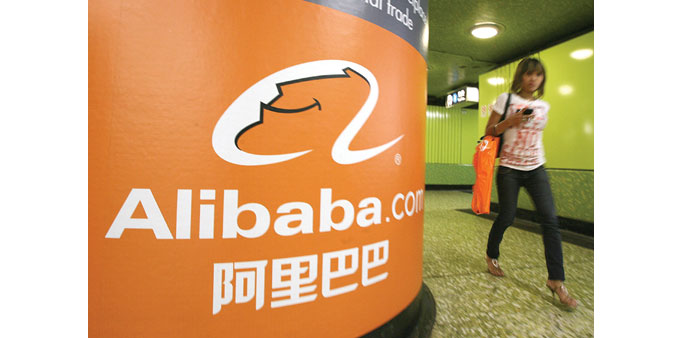Dow Jones
Beijing
Chinese e-commerce company Alibaba Group Holding is rolling out a powerful new incentive to attract luxury brands: removing some listings from its online shopping sites.
Like many premium brands, Burberry had been fretting about a flood of discount Burberry products – some of them fake – on Alibaba’s two big marketplaces, which accounted for 80% of China’s estimated $300bn in online shopping last year. Burberry hadn’t authorised any of those vendors to sell its goods.
Alibaba would do its best to get those products off its sites if Burberry opened its own shop on Alibaba’s online mall, Burberry was told, according to people familiar with the talks. Burberry opened a store on Alibaba’s Tmall in April.
Interviews with nearly three dozen sellers, brands and analysts indicate that Alibaba has recently taken similar steps for other high-profile Western brands, including Estée Lauder Cos., hoping they would embrace Tmall, China’s main online venue for big brands. Alibaba has promised that once they open their own stores, it will purge goods sold on Tmall by retailers not authorised by the brands or do more to fight fakes on Taobao, Alibaba’s online huge online bazaar, according to people familiar with the matter.
Alibaba has been eager to woo high-end brands ahead of a listing on the New York Stock Exchange that is expected to be one of the largest initial public offerings in US history. The presence of luxury brands lends a luster that can draw shoppers, other brands and potentially investors. Before Burberry opened its Tmall store, more than 50 vendors –none of them authorised by Burberry – sold the brand’s products on the site. All those goods had disappeared from the site around the time Burberry’s store opened, according to a study run for The Wall Street Journal by e-commerce analysis firm YipitData, although two resellers of Burberry perfumes returned in July.
Alibaba told many shops on its sites that they had to stop selling the UK brand’s products. It blocked some stores from posting Burberry items, and checked more frequently to make sure vendors weren’t using Burberry copyrighted images, sellers said.
“Tmall is having a change of strategy,” said Vincent Wong, chairman of Hong Kong-based Pompei Holdings, which specialises in selling luxury items at discounted prices and was told to pull Burberry-branded goods from its Tmall shop. “When a global brand opens its store, we are not allowed to display that brand.” Alibaba’s offer to crack down on gray-market goods for brands that open Tmall stores provides a powerful incentive for brands to join the site, said Scott Galloway, chief executive of L2 Inc, a New York-based research firm. Alibaba’s websites are a door to China’s 300mn online shoppers. In 2012, the combined transaction volume of Taobao and Tmall topped one trillion yuan, or about $160bn, more than Amazon.com and eBay combined.
Until now, most high-end brands had resisted opening storefronts, some saying their images could be tarnished by the bargain-basement atmosphere of Tmall, a sprawling marketplace with 70,000 vendors, where so-called gray-market” resellers thrive.
Such vendors buy brand-name goods – often from distributors outside China – and resell them at discounted prices without the companies” authorisation. Many brands frown upon the practice, which is restricted in some countries. Such sales are generally permitted in China, and Alibaba has typically allowed them. By comparison, the sale of counterfeits is illegal in China and online platforms must remove these listings in a timely manner once they have been notified about them, said Haifeng Huang, who specialises in intellectual-property issues at law firm Jones Day.
Alibaba’s intervention can be extremely effective.
Nearly four dozen Tmall shops sold Estée Lauder beauty products earlier this year. But around the time Estée Lauder opened its Tmall store in May, all third-party products had vanished, according to YipitData. Estée Lauder’s opening also benefited its sister brand, Clinique, which had opened a Tmall shop last year: All third-party sales of Clinique products also disappeared from the site in May.
In contrast, the number of third-party vendors selling products from Gucci, which doesn’t have a Tmall store, rose to 69 in June from 63 in April. Third-party vendors of Giorgio Armani SpA and Ralph Lauren Corp – two other brands without a Tmall store – also increased. Gucci and Ralph Lauren declined to comment. An Armani spokesman said the company “engages in various activities around the world to protect (its brands) integrity,” but isn’t commenting on the situation in China. In July, Gucci, Yves Saint Laurent and other luxury brands under Kering SA filed suit against Alibaba, saying that the Internet company’s shopping, marketing and payment platforms “knowingly make it possible for an army of counterfeiters to sell their illegal wares.”

Chinese e-commerce company Alibaba is rolling out a powerful new incentive to attract luxury brands removing some listings from its online shopping s
